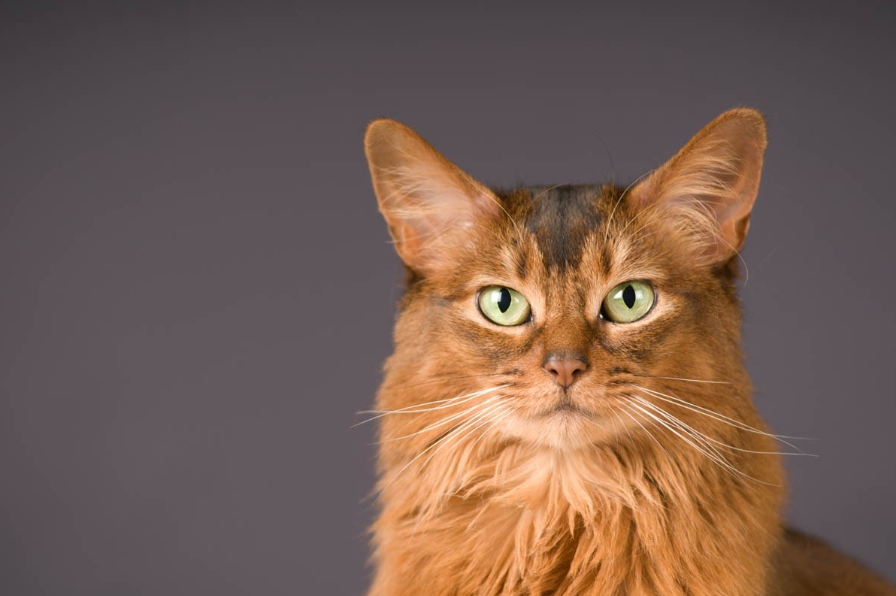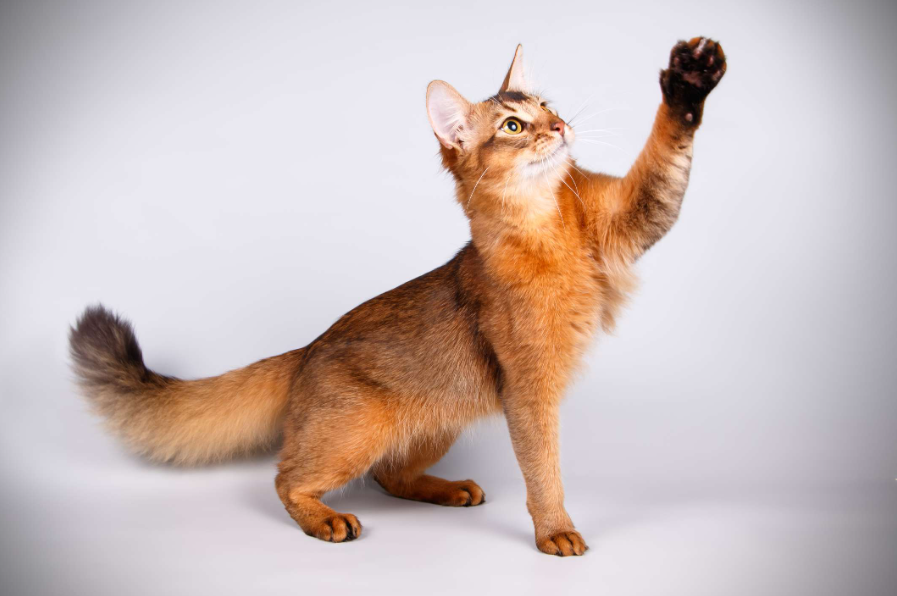Somali Cat
The Somali cat breed is recognized for its striking look as well as its playful nature and lavish coat.
Here are a few of the most important features and details on Somali cats:
Appearance:
- coat: The most distinct characteristics in Somali cats is the bushy, long tails and semi-longhair coats. The coat is fine and soft, and has a pattern of ticking giving it a warm and shining appearance. The ticking is a banding of color on every individual hair shaft.
- Colors: Somali cats come in a range of colors, such as ruddy, blue, red and Fawn. The ticking tends to be more evident in lighter areas of the.
Personality:
- Playful Somali felines are well-known for their active and playful nature. They love playing with each other and frequently create bonds of friendship with their humans.
- Intelligent Cats with this type of intelligence are usually intelligent. are taught to do tricks or make use of certain cat furniture.
- Social Somali cats have a social nature animals and love the company that their family of humans. They also tend to get along well with other animals.
History:
- It is believed that the Somali cat is basically an extended version of the Abyssinian cat. Both breeds have a common basis in that they’re thought to descend from cats originated from Abyssinia (now Ethiopia).
- The longhair gene was found spontaniously during Abyssinian litters, resulting in the evolution of the Somali breed.
Care:
- Hair grooming Given their thick hairs, Somali cats require regular grooming in order to avoid matting and keep their coats in good shape. A few times per week is typically enough.
- Training: These cats are active and get pleasure from regular exercise and play. Playing with toys and engaging them during playtime keeps their bodies and minds active.
Health:
- As with all breeds of cat, Somalis can be prone to health issues like dental issues or ailments related to their coat. Regular vet check-ups are crucial to their overall health.
Somali Cat Health and Feeding
The good health and wellbeing of a Somali cat requires the right diet, regular veterinary treatment, and a focus on the needs of each cat.
Here are some recommendations for the health and nutrition of Somali cats:
1. Nutrition:
- Quality Cat Food Make sure you feed your Somali cat with quality pet food suitable to their age, weight and level of activity. Choose a balanced and balanced diet with the right amount of proteins fats, carbohydrates, and proteins.
- Avoid human food: Resist the temptation to feed them human food, particularly things that can be toxic to cats, like garlic, onions, chocolate and other artificial sweeteners.
2. Feeding Calendar:
- Regular Meals: Establish a regular feeding schedule. Adult cats usually eat daily, but it is recommended to consult your vet to establish the desirable diet for your particular cat.
3. Hydration:
- Pure Water Be sure your Somali cat is able to access fresh and clean water every day. A proper hydration regimen is essential for their overall well-being.
4. Grooming:
- Regular brushing: Due to their extravagant coats and long coats, Somali cats benefit from regular brushing to avoid matting and to reduce shed. Make sure to brush them every few times throughout the week.

5. Dental Care:
- Dental Check-ups The health of your teeth is crucial for cats. Regular dental exams and offering sweets or toys for their teeth can benefit keep their teeth clean.
6. Regular Veterinary Check-ups
- Annual Examinations: Schedule regular veterinary exams, at least every year, to assess the health of your Somali feline’s health overall. take care of any issues that arise, and warrant they’re up to current regarding vaccinations.
7. Training and Mental Stimulation
- Interactive Play Somali cats can be highly active and intelligent So, let them engage in fun and interactive playing. Offer them toys, climbing structures and even food puzzles that keep them mentally and physically engaged.
8. Weight Management
- Watch Weight Be aware of your cat’s weight, and alter their diet in line with it. Overweight can cause a variety of health problems.
9. Parasite Control:
- The prevention of fleas and worms: Follow your veterinarian’s suggestions for flea prevention as well as deworming. Regular treatment can benefit keep your cat safe from internal and external parasites.
10. Spaying/Neutering:
- Reproductive Health If you’re Somali cat isn’t neutered or spayed, you should consider having a discussion with your veterinarian. Spaying or neutering can help protect against certain health issues and unwanted behaviors.
Somali Cat Care and Grooming
Care for the Somali cat requires care for their grooming needs and also offering a comfortable and stimulating space.
Here are some helpful tips to follow Somali grooming and cat care:
1. Grooming:
- Routine Brushing Somali cats are blessed with semi-longhair coats, which require regular brushing to avoid matting and lessen shed. Utilize a soft-bristle comb or a comb specifically designed specifically for cats with long hair. Try at brushing your Somali cat at least once each week.
- Begin at an early age: Introduce grooming practices to your Somali cat from a young age, to create an enjoyable experience. Give them treats and praise throughout or after your grooming.
- Examine Ears: Somali cats as other breeds with long hair, can be susceptible to issues with their ears. Make sure to check their ears on a regular basis to look for signs of dirt inflammation, or wax buildup. Cleanse the ears as needed and consult your doctor for advice on the proper techniques for cleaning your ears.
2. Dental Care:
- Brushing Teeth Healthful teeth are vital in all cat breeds. Introduce teeth-brushing early in the course of your Somali feline’s lifetime with an animal-friendly toothbrush and toothpaste. Regular dental care can help prevent dental issues.
3. Nail Care
- trimming nails: Cut your pet’s nails frequently to keep them from getting too long. Make use of a nail trimmer for your cat and make sure not to cut too thin nail, which could lead to bleeding. If you’re not sure, ask your vet or an well-qualified groomer to demonstrate.
4. Game and exercise
- Interactive Play Somali cats can be active and fun. Give them interactive toys and playtime to keep them mentally and physically active.
- Vertical Space Think about providing spaces such as shelves or cat trees since Somali cats usually enjoy climbs and perching.
5. Feeding:
- Balanced Diet Make sure the Somali cat is eating the right food plan appropriate for their age and health. A balanced diet is essential to an overall healthy coat.

6. Hygiene:
- litter box maintenance: Keep the litter box tidy by regularly scooping it. Somali cats, just like all cats, prefer a tidy and free of odor.
7. Health Monitoring
- Regular Vet Check-ups Make sure to schedule regular veterinary checks to check how your dog’s health is overall. Make sure you address any health concerns that could be present.
8. Social Interaction
- Qualitative Time Enjoy quality time spent in the company of you Somali cat. They are enough fun to be with and develop close bonds with humans.
9. Environmental Enrichment:
- Toys and Puzzles Give your cat a range of puzzles and toys for your Somali cat engaged and mentally stimulated.
10. Safety:
- Interior Environment Somali cats tend to be better suited for an indoor life to guard them from dangers like predators, traffic and illnesses.
FAQs
1. What exactly is an Somali cat?
- The Somali cat breed is recognized for its semi-long hair long coat and bushy-tailed tail and its playful nature. It is in essence an extended variant of the Abyssinian cat that comes in Abyssinia (now Ethiopia).
2. What would the coat of the Somali cat appear like?
- The coat is semi-longhair soft and fine, with a the ticking pattern. Ticking refers to the bands of color along each hair shaft. Somali cats are available in a variety of shades, including ruddy blue, red and Fawn.
3. How big can Somali cats grow?
- Somali cats have medium size and have an athletic body. Females of adulthood weigh between 6 and 10 pounds, and males usually weigh between 10 and 12 pounds.
4. Is it true that Somali cats great with other pets and children?
- Somali cats are renowned for their friendly nature, and they often are able to get along with pets and children. However, the individual personalities of each one differ therefore appropriate introductions and socialization are essential.
5. How do I groom a Somali cat?
- Regular brushing is vital to stop matting and minimize shed. Make use of a soft-bristle comb or a comb specifically designed for cats with long hair. Begin grooming your cat at a young age, and warrant it is pleasant by rewarding them with sweets and praise.
6. Does Somali felines require particular diet?
- Somali cats don’t typically require special diets However, it’s essential to provide them with quality cat food that is appropriate to their weight, age and activity level. Ask your vet to get specific recommendations on diet.
7. Are Somali cats indoor or outdoor cats?
- Somali cats are usually better suited for living in an indoor environment to shield them from dangers like predators, traffic and diseases. Giving them an environment that is stimulating in the indoors is crucial.
8. How many hours of exercising do Somali cats require?
- Somali cats are energetic and playful, which is why they are a great exercise animal. Interaction with toys, as well as opportunities for exploration and climbing benefit keep them mentally and physically stimulated.
9. What health problems are common among Somali cat owners?
- Although Somali cat breeds are typically healthy, Somali can be susceptible to specific health issues, such as dental issues or an ear infection. Regular vet check-ups are vital to check their general health.
10. Do Somali cats be allowed to remain to themselves for extended durations?
- Somali cats, as well as other breeds, can feel lonely when left for long time. They thrive on social interaction with humans and companionship and therefore it is advisable for you to give them with stimulation and fun particularly if you’re absent for long periods of time.






